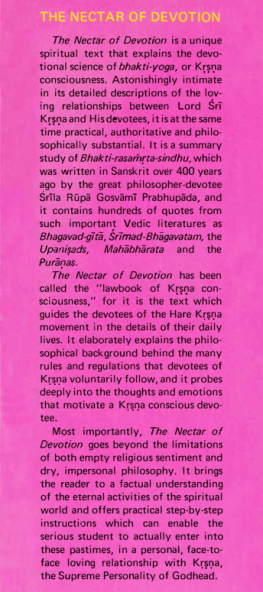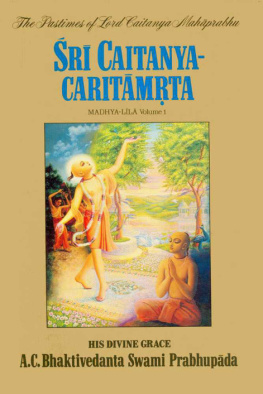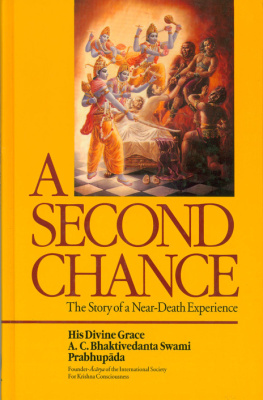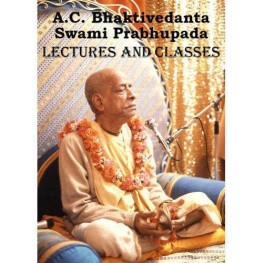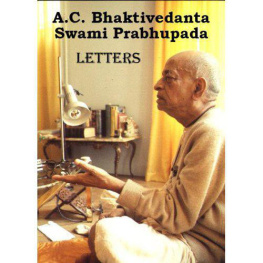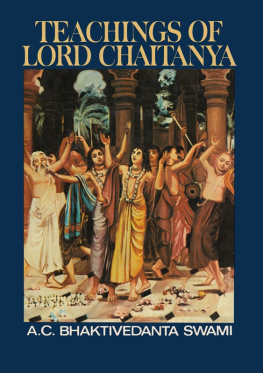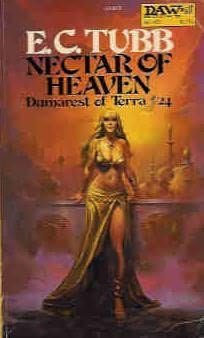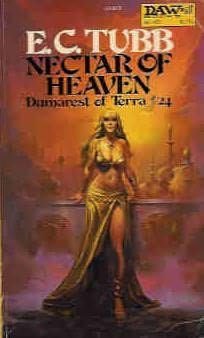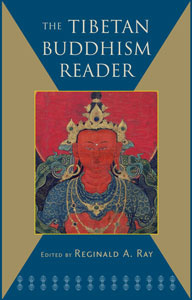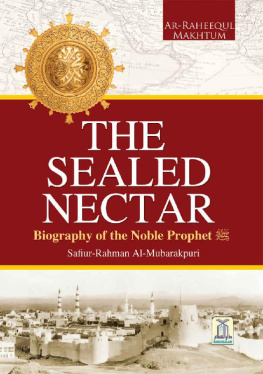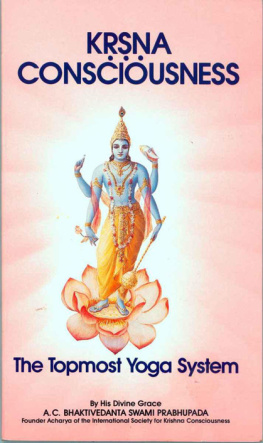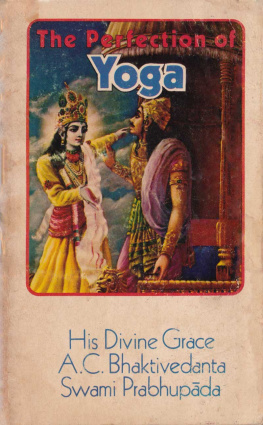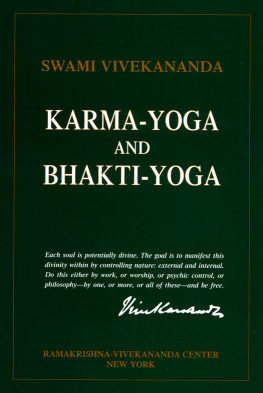front cover inside flap
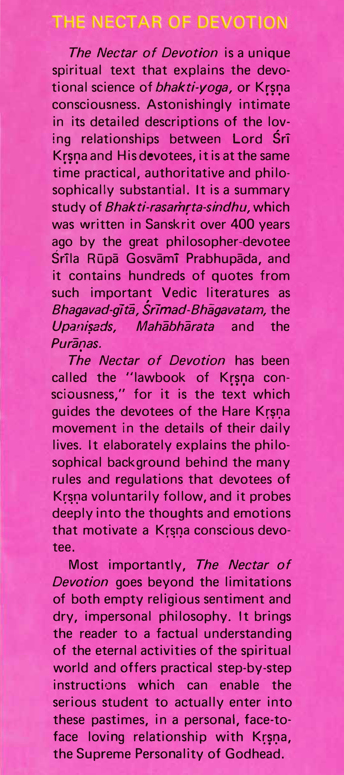
This free for download ebook is a direct reproduction of the original bona fide personally approved and blessed by Srila Prabhupada.
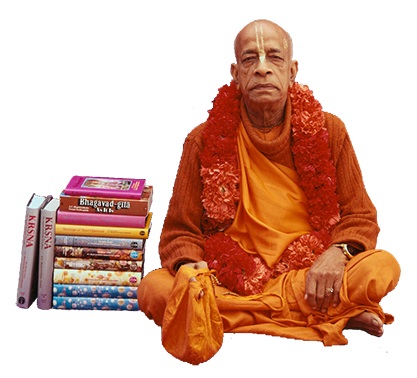
This ebook was made by the official website for Srila Prabhupadas original books:
Krishnapath.org
All the content was directly taken from the original scans, is unchanged and intact.
More free downloads at:
www.krishnapath.org
THE NECTAR OF DEVOTION
THE NECTAR OF
DEVOTION
A Summary Study of ril Rpa Gosvm's
Bhakti-rasmta-sindhu
A. C. Bhaktivedanta Swami
crya of International Society for Krishna Consciousness
ISKCON PRESS
38 North Beacon Street
Boston, Massachusetts 02134
Copyright 1970 by ISKCON PRESS
Library of Congress Catalogue Card Number: 78-118082
All Rights Reserved
Printed in the United States of America by ISKCON PRESS
Boston, Massachusetts
To the Six Gosvms of Vndvana
nn-stra-vicraaika-nipuau sad-dharma-sasthpakau
lokn hitakriau tribhuvane mnyau araykarau
rdh-ka-padravinda-bhajannandena mattlikau
vande rpa-santanau raghuyugau r-jva-goplakau.
"I offer my respectful obeisances unto the six Gosvms, namely r Santana Gosvm, r Rpa Gosvm, r Raghuntha Bhaa Gosvm, r Raghuntha dsa Gosvm, r Jva Gosvm and r Gopla Bhaa Gosvm, who are very expert in scrutinizingly studying all the revealed scriptures with the aim of establishing eternal religious principles for the benefit of all human beings. Thus they are honored all over the three worlds, and they are worth taking shelter of because they are absorbed in the mood of the gops and are engaged in the transcendental loving service of Rdh and Ka."
Table of Contents
CONTENTS
PART ONE
PART TWO
PART III
PART IV
Preface
The Nectar of Devotion is a summary study of Bhakti-rasmta-sindhu, which was written in Sanskrit by rla Rpa Gosvm Prabhupda. He was the chief of the six Gosvms who were the direct disciples of Lord Caitanya Mahprabhu. When he first met Lord Caitanya, rla Rpa Gosvm Prabhupda was engaged as a minister in the Mohammedan government of Bengal. He and his brother Santana were then named Skara Mallik and Dabir Khs respectively, and they held responsible posts as ministers of Nawab Hussain Shah. At that time, five hundred years ago, the Hindu society was very rigid, and if a member of the brhmaa caste accepted the service of a Mohammedan ruler he was at once rejected from brhmaa society. That was the position of the two brothers, Dabir Khs and Skara Mallik. They belonged to the highly situated srasvata-brhmaa community, but they were ostracized due to their acceptance of ministerial posts in the government of Hussain Shah. It is the grace of Lord Caitanya that He accepted these two exalted personalities as His disciples and raised them to the position of gosvms, the highest position of brahminical culture. Similarly, Lord Caitanya accepted Haridsa Thkur as His disciple although he happened to be born of a Mohammedan family, and Lord Caitanya later on made him the crya of the chanting of the holy name of the Lord: Hare Ka, Hare Ka, Ka Ka, Hare Hare/ Hare Rma, Hare Rma, Rma Rma, Hare Hare.
Lord Caitanya's principle is universal. Anyone who knows the science of Ka and is engaged in the service of the Lord is accepted as being in a higher position than a person born in the family of a brhmaa. That is the original principle accepted by all Vedic literatures, especially by the Bhagavad-gt and the rmad-Bhgavatam. The principle of Lord Caitanya's movement in educating and elevating everyone to the exalted post of a gosvm is taught in The Nectar of Devotion.
Lord Caitanya met the two brothers, Dabir Khs and Skara Mallik, in a village known as Rmakeli in the district of Maldah, and after that meeting the brothers decided to retire from government service and join Lord Caitanya. Skara Mallik, who was later to become Rpa Gosvm, retired from his post and collected all the money he had accumulated during his service. It is described in the Caitanya-caritmta that his accumulated savings in gold coins equalled millions of dollars and filled a large boat. He divided the money in a very exemplary manner which should be followed by devotees in particular and by humanity in general. Fifty percent of his accumulated wealth was distributed to the Ka conscious persons, namely the brhmaas and the Vaiavas; twenty-five percent was distributed to relatives; and twenty-five percent was kept against emergency expenditures and personal difficulties. Later on when Dabir Khs also proposed to retire, the Nawab was very much agitated and put him into jail. But Dabir Khs, who was later to become rla Santana Gosvm, took advantage of his brother's personal money, which had been deposited with a village banker, and escaped from the prison of Hussain Shah. In this way both brothers joined Lord Caitanya Mahprabhu.
Rpa Gosvm first met Lord Caitanya at Prayg (Allahabad, India), and on the Davamedha bathing ght of that holy city the Lord instructed him continually for ten days. The Lord particularly instructed Rpa Gosvm on the science of Ka consciousness. These teachings of Lord Caitanya to rla Rpa Gosvm Prabhupda are narrated in our book Teachings of Lord Caitanya.
Later, rla Rpa Gosvm Prabhupda elaborated the teachings of the Lord with profound knowledge of revealed scriptures and authoritative references from various Vedic literatures. rla rnivsa crya describes in his prayers to the six Gosvms that they were all highly learned scholars, not only in Sanskrit but also in foreign languages such as Persian and Arabian. They very scrutinizingly studied all the Vedic scriptures in order to establish the cult of Caitanya Mahprabhu on the authorized principles of Vedic knowledge. The present Ka consciousness movement is also based on the authority of rla Rpa Gosvm Prabhupda. We are therefore generally known as rpnugas, or followers in the footsteps of rla Rpa Gosvm Prabhupada. It is only for our guidance that rla Rpa Gosvm prepared his book Bhakti-rasmta-sindhu, which is now presented in the form of The Nectar of Devotion. Persons engaged in the Ka consciousness movement may take advantage of this great literature and be very solidly situated in Ka consciousness.
Bhakti means devotional service. Every service has some attractive feature which drives the servitor progressively on and on. Every one of us within this world is perpetually engaged in some sort of service, and the impetus for such service is the pleasure we derive from it. Driven by affection for his wife and children, a family man works day and night. A philanthropist works in the same way for love of the greater family, and a nationalist for the cause of his country and countrymen. That force which drives the philanthropist, the householder and the nationalist is called rasa, or a kind of mellow (relationship) whose taste is very sweet. Bhakti-rasa is a mellow different from the ordinary rasa enjoyed by mundane workers. Mundane workers labor very hard day and night in order to relish a certain kind of rasa which is understood as sense gratification. The relish or taste of the mundane rasa does not long endure, and therefore mundane workers are always apt to change their position of enjoyment. A businessman is not satisfied by working the whole week; therefore, wanting a change for the weekend, he goes to a place where he tries to forget his business activities. Then, after the weekend is spent in forgetfulness, he again changes his position and resumes his actual business activities. Material engagement means accepting a particular status for some time and then changing it. This position of changing back and forth is technically known as bhoga-tyga, which means a position of alternating sense enjoyment and renunciation. A living entity cannot steadily remain either in sense enjoyment or in renunciation. Change is going on perpetually, and we cannot be happy in either state because of our eternal constitutional position. Sense gratification does not endure for long, and it is therefore called capala-sukha, or flickering happiness. For example, an ordinary family man who works very hard day and night and is successful in giving comforts to the members of his family thereby relishes a kind of mellow, but his whole advancement of material happiness immediately terminates along with his body as soon as his life is over. Death is therefore taken as the representative of God for the atheistic class of men. The devotee realizes the presence of God by devotional service, whereas the atheist realizes the presence of God in the shape of death. At death everything is finished, and one has to begin a new chapter of life in a new situation, perhaps higher or lower than the last one. In any field of activity, political, social, national or international, the result of our actions will be finished with the end of life. That is sure.

